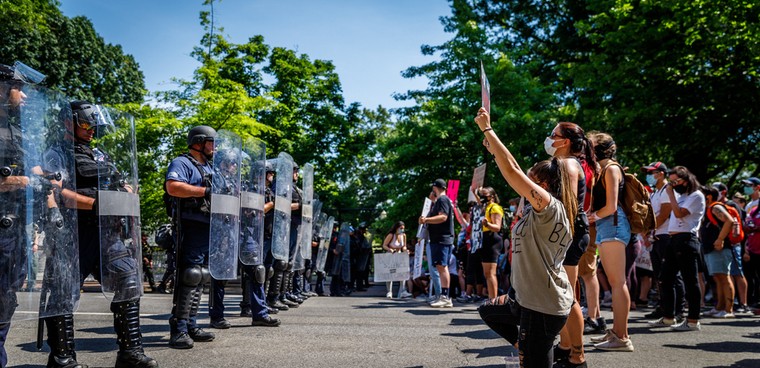Federal prison riot squads deployed to D.C.
A former union official says crisis management teams have historically been deployed for crowd control, protecting federal buildings.

Protesters face off against law enforcement officers near the White House. June 3, 2020. (Photo credit: bgrocker/shutterstock.com)
On June 1, President Trump ordered federal law enforcement agencies to deploy to Washington, D.C. to police ongoing protests over the death of George Floyd, an African-American killed by a Minneapolis police officer in an incident captured on video.
One of the federal agencies dispatched was the Bureau of Prisons – members of units specializing in suppressing prison riots drew criticism from the public and journalists for appearing in the streets of the nation's capital without uniforms or much in the way of identifiable insignia.
The agency confirmed to FCW that the Attorney General ordered BOP crisis management teams, including special operations response teams and disturbance control teams, to deploy to D.C. in order to help quell civil unrest. BOP declined to specify when agency personnel would leave the capital or how many employees had been deployed there, citing safety and security reasons.
The BOP public affairs office said that the U.S. Marshals Service has the power to deputize such teams to "enforce federal criminal statutes and protect federal property and personnel."
Michael Castelle Sr., the former National Fair Practices Coordinator for the American Federation of Government Employee Council of Prison Locals C-33, told FCW in an interview that such teams may be deputized by the U.S. Marshals Service to perform arrests, enforce crowd control, and protect federal buildings.
AFGE CPL-33 represents some 30,000 BOP employees within federal prisons across the U.S.
"Nine times out of ten [the teams] are there to protect federal buildings. They're supposed to show a force of resistance towards any rioters and make them hesitant to gain access to a certain building."
As a BOP employee, Castelle was deployed to Talladega, Ala., in 1991 to support a Federal Bureau of Investigation hostage rescue team at the federal correctional institute there after 121 inmates scheduled for deportation to Cuba took nine prison staff members hostage. He also deployed to Los Angeles the following year in response to civil unrest that arose after four police officers were acquitted of beating Rodney King.
"We were more or less deployed to California to do crowd control and protect property," he stated. "We were there to prevent rioting and looting. We were deputized to restrain, arrest, and give a visible show of force."
He added that while the number depends on the size of the crisis, such teams usually have about 13 members who are trained to be proficient in areas such as firearms and crowd control tactics. Castelle said that crowd control scenarios included the use of flashbangs and formation tactics to retrieve any crowd member who was targeted for detainment.
BOP told FCW that it was common for some personnel to not wearing identifying information on their gear, and that D.C.-deployed members were not wearing BOP-specific clothing because they "were serving a broader mission."
Rep. Jamie Raskin (D-Md.) led House members in calling for U.S. Attorney General William Barr to identify the federal personnel deployed to quell the unrest. House Speaker Nancy Pelosi (D-Calif.) sent her own letter to President Trump asking him for a full list of agencies involved and to clarify their roles and responsibilities.
A spokesman from the national AFGE office was unable to provide a statement from the CPL C-33 but said that federal employees were allowed to participate in protests.
AFGE issued a statement on June 8 affirming the union's support for the protests against police brutality and the Black Lives Matter movement, and reinforcing support for the law enforcement union locals under its banner.
"While some have claimed that unions representing law enforcement officers are the problem, as a union that proudly represents law enforcement officers, we commit to being part of the solution," read the statement attributed to the AFGE's National Executive Council. "As we continue to fight to improve law enforcement officers' working conditions and ensure fair employment processes for our members, we affirm our right to bargain for accountability procedures that use evidence and impartial third parties to adjudicate allegations of misconduct so the truth can dictate the outcome."
AFGE national and local officials declined to answer specific questions from FCW about the use of BOP personnel at protests.





